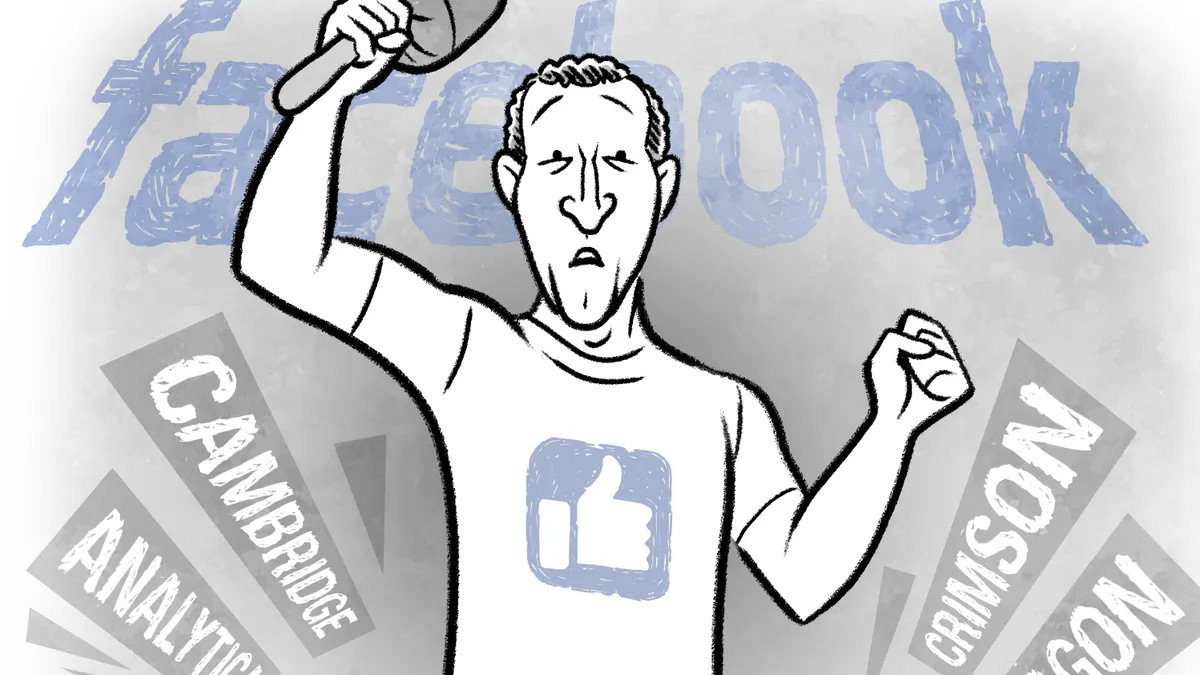Dive Brief:
- Landmark antitrust lawsuits against Facebook were tossed out by a District of Columbia federal court on Monday, dealing a blow to regulators' efforts to curb the social networking giant's power.
- Separate lawsuits submitted by the Federal Trade Commission (FTC) and more than 40 state attorneys general late last year alleged that Facebook has grown into a social media monopoly that uses its market dominance to squash or acquire rivals. The complaints pushed for Facebook to spin off its Instagram and WhatsApp platforms, two acquisitions that previously received regulatory approval.
- In a ruling Monday, U.S. District Judge James Boasberg wrote that the FTC failed to "plausibly establish" Facebook's monopoly power. Separately addressing the states' complaints, Boasberg said there was too wide a time gap to challenge the Instagram and WhatsApp acquisitions, which were completed in 2012 and 2014, respectively. The moves speak to the difficulty regulators will face in reigning in tech companies that offer free services that operate within the nebulous bounds of the internet.
Dive Insight:
A potential breakup of Facebook — which would reshape the tech world and carry steep implications for advertisers who spend billions across its platforms — is less likely with the rulings handed down Monday. The Washington, D.C. federal court's decisions lend credence to skepticism expressed by some industry watchers when the lawsuits were initially filed in December, namely that regulators waited too long to crack down on Facebook's dealmaking and that U.S. antitrust laws simply don't account for the ways that internet companies operate.
Boasberg's dismissal of the FTC lawsuit as "legally insufficient" is indicative of the challenges in proving that a company like Facebook wields outsized influence. The judge specifically took issue with claims that Facebook holds a market share in excess of 60%, which he said was an unsupported assertion. He called out the fact that personal social networking services are free to use and sometimes hard to define, creating a market that is not "ordinary or intuitive."
The news could be interpreted as a win for Big Tech as other companies in the sector, including Google, grapple with their own regulatory crackdowns. Facebook meanwhile has made efforts to unify its platforms on the back end, something that could make spinning off apps like Instagram more difficult. Still, Big Tech's power is likely to remain in the spotlight regardless of Monday's rulings. The Biden administration has appointed several tough critics of the industry, most notably Lina Khan, who was tapped to lead the FTC earlier this month.
Mounting government scrutiny and even advertiser boycotts have not meaningfully stoppered Facebook's business. The company, fortified by a pandemic period that led troves of people to spend more time on social media, saw advertising sales rise 46% year-on-year to $25.44 billion in the first quarter of 2021. Executives said revenue gains in the second quarter would be strong compared to last year, when the onset of the COVID-19 crisis led to some advertiser pullbacks.
At the same time, Facebook is contending with some of its heftiest external competitive threats in years. TikTok, the video-sharing platform owned by Chinese tech conglomerate ByteDance, has asserted itself as a favorite app among the types of young consumers that are showing less favor for Facebook. Facebook has introduced several features that closely emulate the TikTok user experience, including Instagram Reels, which started running ads earlier this month.















